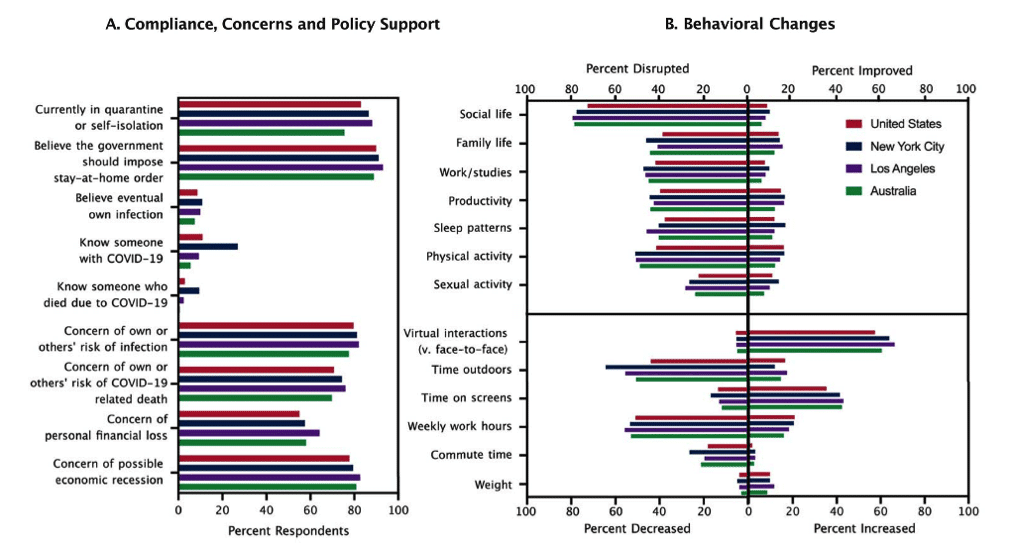
27 Apr Widespread Public Support and Compliance for Stay-at-Home Policies
MedicalResearch.com Interview with:
Mark Czeisler MPhil
-2020 Fulbright Future Scholar
Australian-American Fulbright Commission
Funded by the Kinghorn Family Foundation
-Honorary Research Fellow, Institute for Breathing and Sleep Austin Health
-Master’s candidate School of Psychological Sciences and
Turner Institute for Brain and Mental Health
Monash University
MedicalResearch.com: What is the background for this study?
Response: Recognizing the difficult decisions of when and how to manage stringent COVID-19 mitigation strategies faced by health officials and policymakers, researchers at Brigham and Women’s Hospital and Monash University sought to assess public compliance with and support for the current mitigation strategies (e.g., quarantine, stay-at-home orders). We also assessed the life impact of such stringent tactics.
We acquired nationally demographically representative samples from one nation and city with large numbers of COVID-19 infections and deaths (US and New York City) and one nation and city with comparatively small numbers of COVID-19 infections and deaths (Australia and Los Angeles).
MedicalResearch.com: What should readers take away from your report?
Response: As displayed in the figure below, more than 80 percent of respondents are compliant with quarantine or stay-at-home policies, and more than 90 percent support a government-imposed stay-at-home mandate lasting at least three weeks or until public health or government officials determine that it is safe to scale back these measures.

rom: Czeisler MÉ, Howard ME, Robbins R, Barger LK, Facer-Childs ER, Rajaratnam SMW, Czeisler CA. COVID-19: Public Compliance with and Public Support for Stay-at-Home Mitigation Strategies. medRxiv 2020.04.22.20076141; doi: https://doi.org/10.1101/2020.04.22.20076141; https://t.co/6ayABCDoK4
Resounding public compliance with and support for stringent mitigation strategies was consistent across regions with varying COVID-19 prevalence and spanned the political spectrum despite widespread life disruption (including social and family life, work/studies, physical activity, and sleep patterns).
MedicalResearch.com: What recommendations do you have for future research as a result of this work?
Response: As controversies over the balance between the duration and the nature of COVID-19 mitigation strategies and related consequences continue to mount, surveillance monitoring of public priorities for, compliance with, and life impact of those strategies is paramount.
However, the need for rapid collection and dissemination of information must not be prioritized over the requirement of research integrity. Commitment to these principles is critical to ensure that respondents representative of all groups, not just the most strident, are considered when evaluating public policy options.
MedicalResearch.com: Is there anything else you would like to add?
Response: These timely findings from the first nationally representative survey of the United States and Australia indicate that the vast majority of the public is not only willing to accept current stringent mitigation measures and their associated costs, but that people endorse their continuation until the COVID-19 pandemic is controlled. It is our hope that policymakers will consider public priorities and attitudes when making decisions about when to lift current mitigation strategies.
Citation:
COVID-19: Public Compliance with and Public Support for Stay-at-Home Mitigation Strategies
Mark É Czeisler, Mark E Howard, Rebecca Robbins, Laura K Barger, Elise R Facer-Childs, Shantha MW Rajaratnam, Charles A Czeisler
medRxiv 2020.04.22.20076141; doi: https://doi.org/10.1101/2020.04.22.20076141
JOIN OUR EMAIL LIST
[mailpoet_form id="5"]We respect your privacy and will never share your details.
[last-modified]
The information on MedicalResearch.com is provided for educational purposes only, and is in no way intended to diagnose, cure, or treat any medical or other condition. Always seek the advice of your physician or other qualified health and ask your doctor any questions you may have regarding a medical condition. In addition to all other limitations and disclaimers in this agreement, service provider and its third party providers disclaim any liability or loss in connection with the content provided on this website.
Last Updated on May 12, 2020 by Marie Benz MD FAAD
